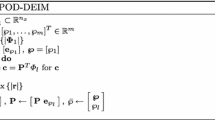Model-based optimal control of water flooding generally involves multiple reservoir simulations, which makes it into a time-consuming process. Furthermore, if the optimization is combined with inversion, i.e., with updating of the reservoir model using production data, some form of regularization is required to cope with the ill-posedness of the inversion problem. A potential way to address these issues is through the use of proper orthogonal decomposition (POD), also known as principal component analysis, Karhunen–Loève decomposition or the method of empirical orthogonal functions. POD is a model reduction technique to generate low-order models using ‘snapshots’ from a forward simulation with the original high-order model. In this work, we addressed the scope to speed up optimization of water-flooding a heterogeneous reservoir with multiple injectors and producers. We used an adjoint-based optimal control methodology that requires multiple passes of forward simulation of the reservoir model and backward simulation of an adjoint system of equations. We developed a nested approach in which POD was first used to reduce the state space dimensions of both the forward model and the adjoint system. After obtaining an optimized injection and production strategy using the reduced-order system, we verified the results using the original, high-order model. If necessary, we repeated the optimization cycle using new reduced-order systems based on snapshots from the verification run. We tested the methodology on a reservoir model with 4050 states (2025 pressures, 2025 saturations) and an adjoint model of 4050 states (Lagrange multipliers). We obtained reduced-order models with 20–100 states only, which produced almost identical optimized flooding strategies as compared to those obtained using the high-order models. The maximum achieved reduction in computing time was 35%.
Similar content being viewed by others
References
H. Asheim, Maximization of water sweep efficiency by controlling production and injection rates, paper SPE 18365, in: Proc. SPE European Petroleum Conference, London, UK (1988).
K. Aziz and A. Settari, Petroleum Reservoir Simulation (Applied Science Publishers, London, UK, 1979).
D.R. Brouwer and J.D. Jansen, Dynamic optimisation of water flooding with smart wells using optimal control theory, SPE J. (2004) 391–402, December.
G.H. Golub and C. Van Loan, Matrix Computations, 3rd Edition (John Hopkins Univ. Press, Baltimore, MD, 1983).
T. Heijn, R. Markovinović and J.D. Jansen, Generation of low-order reservoir models using system-theoretical concepts, paper SPE 79674, in: Proc. Reservoir Simulation Symposium, Houston, TX, USA, 3–5 February (2003).
P. Holmes, J.L. Lumley and G. Berkooz, Turbulence, Coherent Structures, Dynamical Systems and Symmetry (Cambridge University Press, Cambridge, 1996).
H.V. Ly and H.T. Tran, Modeling and control of physical processes using proper orthogonal decomposition, Math. Comput. Model. 33 (2001) 223–236.
R. Markovinović, E.L. Geurtsen, T. Heijn and J.D. Jansen, Generation of low-order reservoir models using POD, empirical gramians and subspace identification, in: Proc. 8th European Conf. on the Mathematics of Oil Recovery (ECMOR VIII), Freiberg, Germany, E31 (2002) pp. 1–10.
M. Meyer and H.G. Matthies, Efficient model reduction in non-linear dynamics using the Karhunen–Loève expansion and dual-weighted-residual methods, Comput. Mech. (2003) 179–191.
G. Naevdal, D.R. Brouwer and J.D. Jansen, Water flooding using closed-loop control, Comput. Geosci. (2006), DOI: 10.1007/s10596-005-9010-6.
D.W. Peaceman, Fundamentals of Numerical Reservoir Simulation (Elsevier Scientific Publishing Company, Amsterdam, The Netherlands, 1977).
R.D. Prabhu, S.S. Collis and Y. Chang, The influence of control on proper orthogonal decomposition of wall-bounded turbulent flows, Phys. Fluids 13(2) (2001) 520–537.
S.S. Ravindran, Reduced-order adaptive controllers for fluid flows using POD, J. Sci. Comput. 14(4) (2000) 457–478.
P. Sarma, K. Aziz and L.J. Durlofsky, Implementation of adjoint solution for optimal control of smart wells, paper SPE 92864, in: Proc. SPE Reservoir Simulation Symposium, Houston, TX, USA (2005).
P. Sarma, L.J. Durlofsky, K. Aziz and W.H. Chen, Efficient real-time reservoir management using adjoint-based optimal control and model updating, Comput. Geosci. (2006), DOI: 10.1007/s10596-005-9009-z.
L. Sirovich, Turbulence and the dynamics of coherent structures. Part 1: Coherent structures, Q. Appl. Math. 45(3) (1987) 561–571.
B. Sudaryanto and Y.C. Yortsos, Optimization of fluid front dynamics in porous media using rate control. I. Equal mobility fluids, Phys. Fluids 12(7) (2000) 1656–1670.
P.T.M. Vermeulen, A.W. Heemink and C.B.M. Te Stroet, Reduced models for linear groundwater flow models using empirical orthogonal functions, Adv. Water Resour. 27 (2004) 54–69.
G.A. Virnovski, Water flooding strategy design using optimal control theory, in: Proc. 6th European Symposium on IOR, Stavanger, Norway (1991) pp. 437–446.
Author information
Authors and Affiliations
Corresponding author
Rights and permissions
About this article
Cite this article
van Doren, J.F.M., Markovinović, R. & Jansen, JD. Reduced-order optimal control of water flooding using proper orthogonal decomposition. Comput Geosci 10, 137–158 (2006). https://doi.org/10.1007/s10596-005-9014-2
Received:
Accepted:
Published:
Issue Date:
DOI: https://doi.org/10.1007/s10596-005-9014-2




